Calabrian crushed olives to preserve in oil, crushed with a stone as per tradition or even with a simple meat tenderizer, which in our Calabrian dialect are the ‘alivi ammaccate ca petra sutt’olio’. The preparation of crushed olives in oil allows you to preserve green olives, pitted, seasoned with fragrant aromas, in oil jars. Crushed olives are a specialty in Calabria, part of the Calabrian culinary tradition, just like oven-baked black olives, widely used both as appetizers and aperitifs but also in cooking for more complex recipes. In mid-October, the olive harvest period begins in Calabria, starting with the green olive harvest, ideal for this preparation, but also highly used for making good olive oil. The most widespread and suitable varieties are Carolea olives, but other varieties such as Nocellara can also be used. For preparing crushed olives to preserve in oil, as mentioned, you need green olives, which can be harvested when they are plump and shiny and ready for oil production. If harvested too dull green, and not plump and shiny enough, it will be difficult to remove the pit. The preparation of crushed olives involves an initial phase where the olives, after being cleaned and selected, are crushed and pitted. This is followed by a debittering phase in water, with no other ingredients, and only at the end of this process will they be ready for preservation, seasoned with salt, garlic, chili peppers, and wild fennel that gives a special aroma. Now I’ll leave you with my family’s recipe for crushed olives in oil, an ancient recipe passed down from generation to generation.
You can find this recipe in the collection of how to preserve olives.
Here are many other methods for preserving olives.
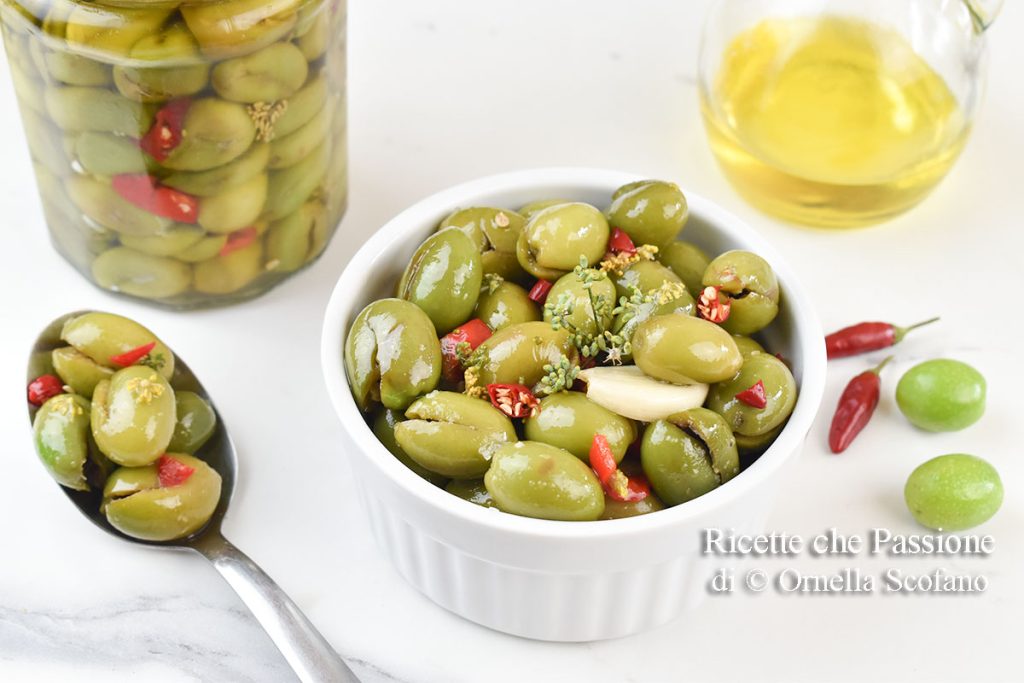
- Difficulty: Medium
- Cost: Economical
- Rest time: 3 Days
- Preparation time: 1 Hour
- Portions: 6 large jars
- Cooking methods: No cooking
- Cuisine: Italian
- Seasonality: Autumn
Ingredients for about 6 jars of crushed olives
- 11 lbs green olives (Carolea in Calabria)
- 1 tsp wild fennel seeds
- 5 cloves garlic
- 5 hot chili peppers
- 10 sweet red peppers (small ones)
- 1.76 oz salt per kg of pitted olives
- to taste olive oil or seed oil
Tools
- 1 Cutting board
- 1 Meat tenderizer
- 6 Jars
- Gloves
- 2 Bowls
- 1 Tea towel
- 1 Plate
Steps to Prepare Calabrian Crushed Olives in Oil
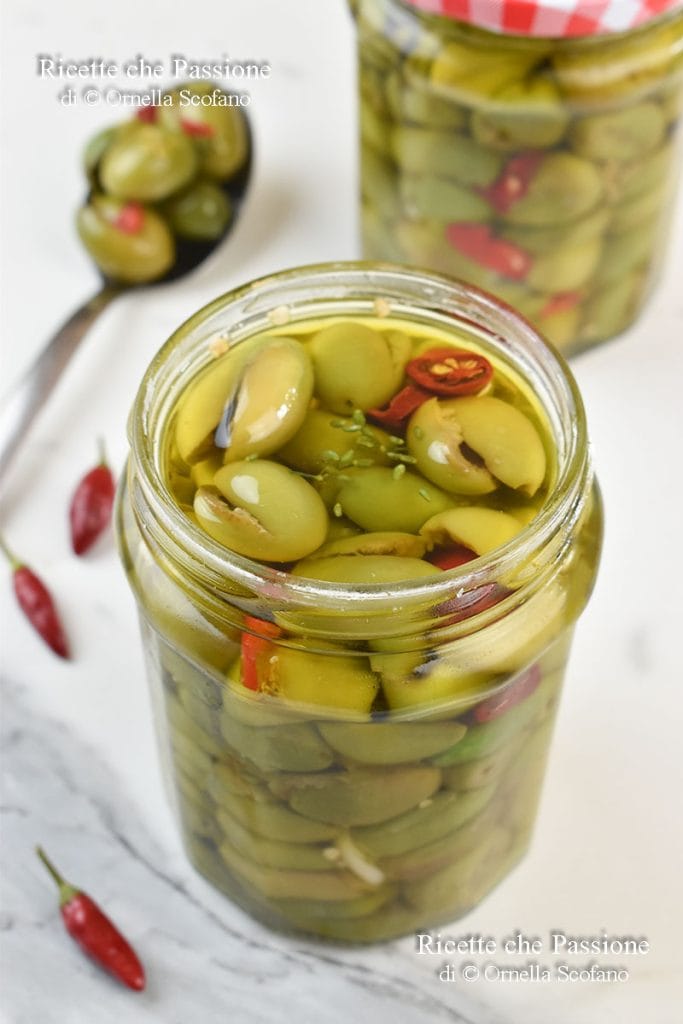
1. First, wash the olives and let them drain. Remove any leaves and soil if they fell to the ground, but it’s always best to pick them directly from the tree without letting them fall.
2. On a wooden or marble surface, crush the olives, one at a time. In Calabria, a stone is traditionally used to crush olives, which is kept year after year. If you can’t find a smooth, easy-to-hold stone, you can use a meat tenderizer, rolling pin, or a heavy glass. To understand the procedure well and be quick, watch the video. Use gloves if you don’t want to stain yourself, and watch out for splashes.
3. As you crush the olives, put them in a bowl with plenty of cold water. It’s important to immediately soak them so they don’t come in contact with air and darken.
Selected green olives to be crushed
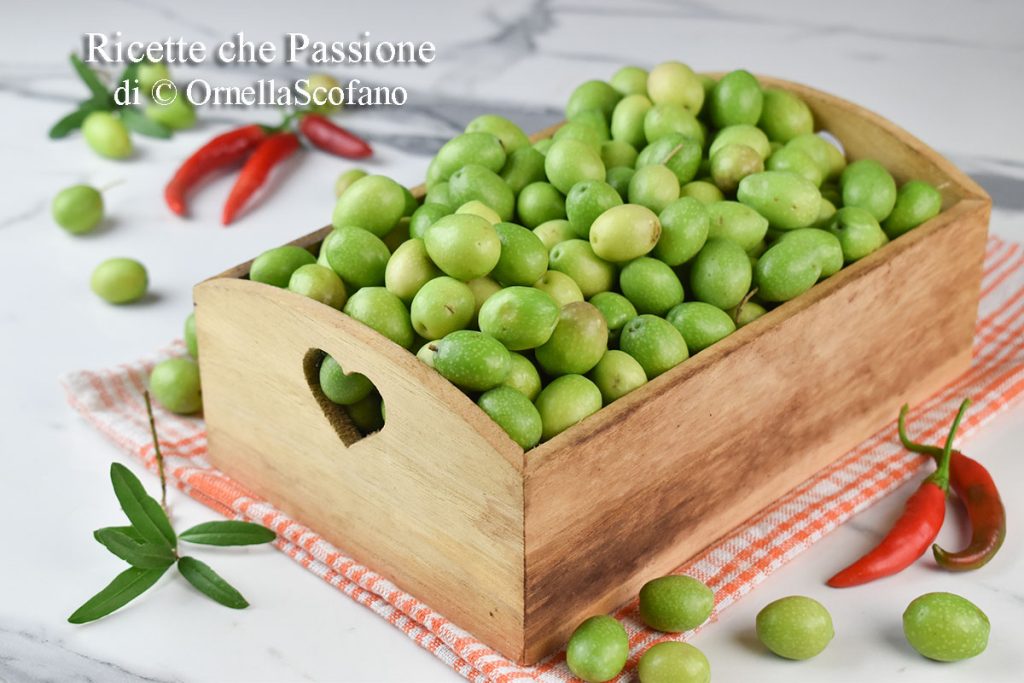
Crush the olives on a marble surface with a meat tenderizer
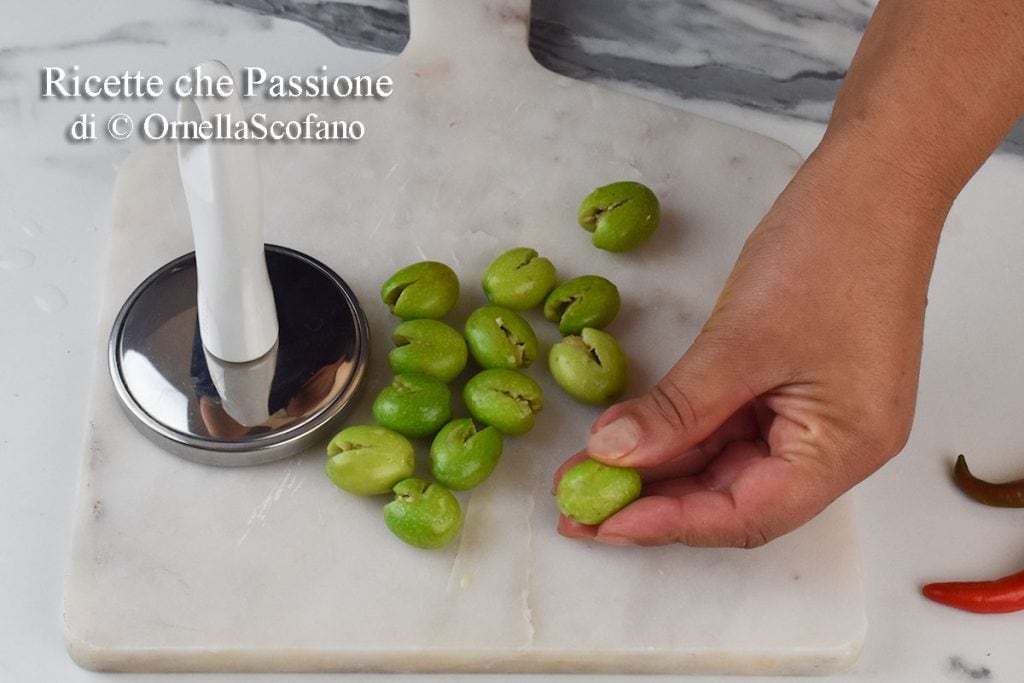
Immediately soak the crushed olives to prevent them from darkening (oxidizing)
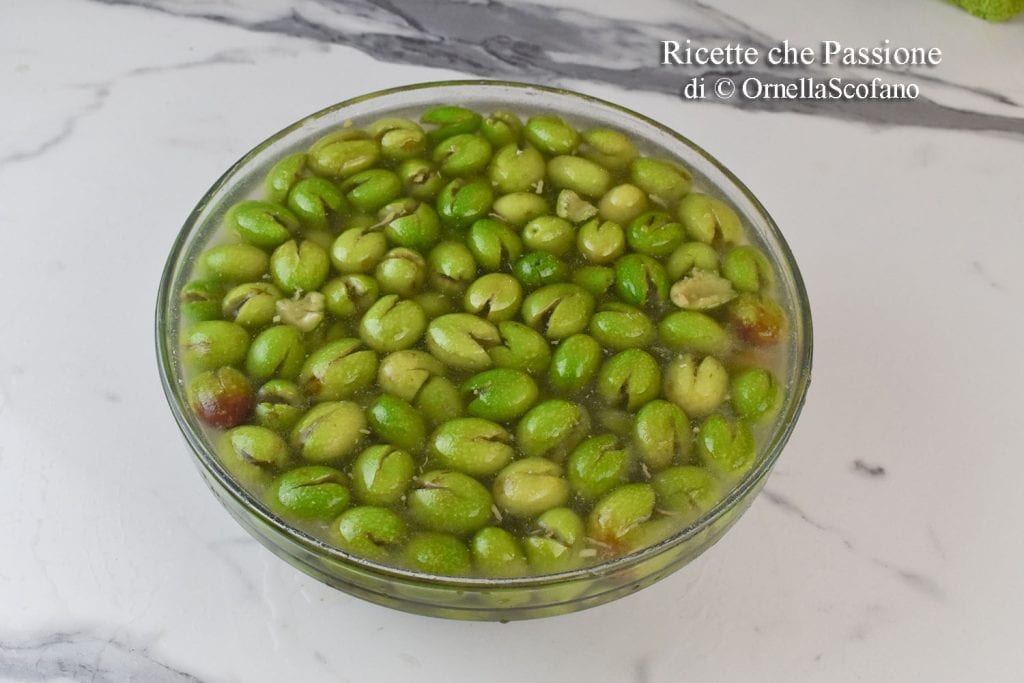
4. When you’ve crushed a good amount of olives, proceed to pit them. Place clean water in another bowl, and as you remove the pits, place them in this bowl to separate them from those with the pit.
5. When all the olives are ready, wash them, and cover with clean water. Cover with a tea towel, and place a weight on top to keep the olives well covered by water, so they don’t darken, or you can simply cover with a plate, the plate should be covered with water.
6. Keep the pitted olives soaking for about 3 days to soften them, changing the water even twice a day, if necessary prolong a few more days, continuing to change the water at least once a day.
7. After 2 or 3 days, you can taste the olives, if they are no longer bitter you can proceed with preservation, otherwise leave them soaking a bit longer. The debittering period of the olives can vary depending on the variety, usually, for our olives, 3 days is enough, without having to use salt in the water.
8. At this point, prepare the olives for preservation. Rinse them again, and then squeeze them hard, you can squeeze them between your hands, very hard, or with a specific press, a press for vegetables, also suitable for preparing eggplants in oil and zucchini in oil, pickles, and much more.
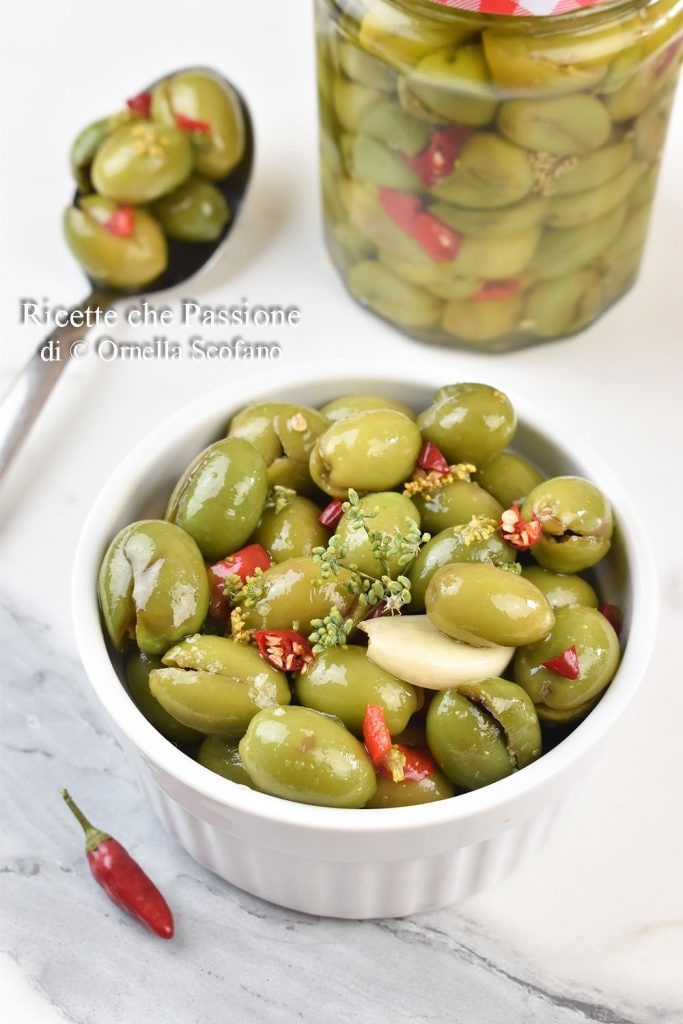
9. Put the well-squeezed olives in a bowl and season them with salt, about 50 g, or even a few grams more if you need to preserve them for a long time, per kg of pitted, debittered, and crushed olives, sliced garlic, chili peppers and peppers into slices, and wild fennel, fresh is fine too, freshly picked, it doesn’t have to be dried. Mix well. Taste them before jarring, they should be slightly savory, the salt must not be missing, otherwise, they will become soft. If you want to be more cautious with garlic and chili peppers and wild fennel, for safer preservation, you can soak these spices in vinegar for 12 hours before adding them.
10. Jar the olives, packing them tightly in sterilized jars, see how to prepare sterilized jars. You need 6 to 10 jars, depending on the size.
Squeezed olives
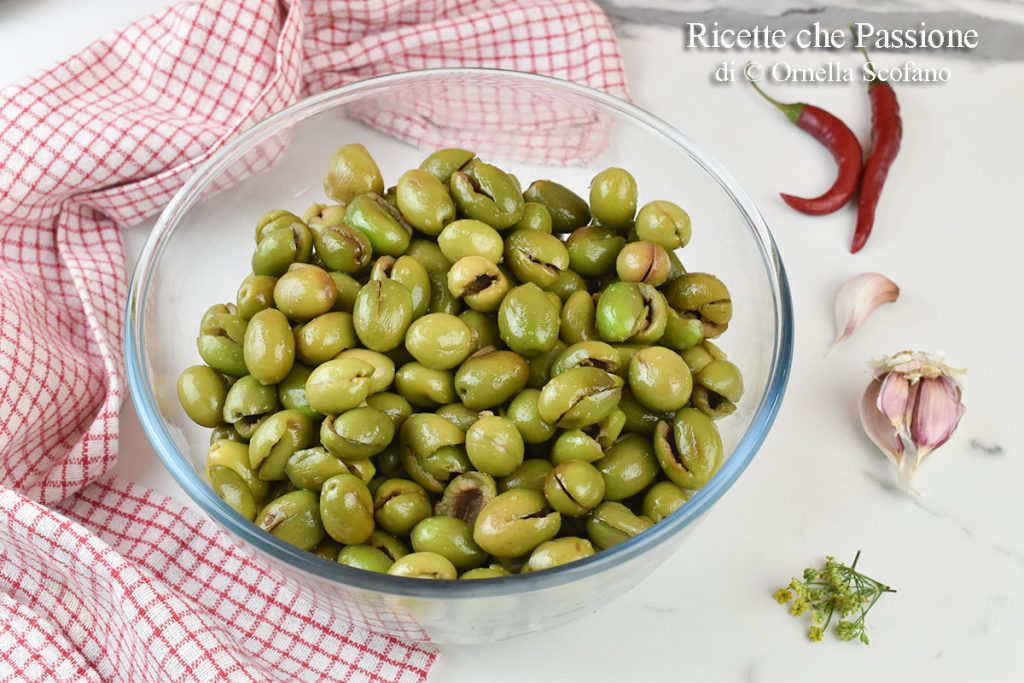
Seasoned olives
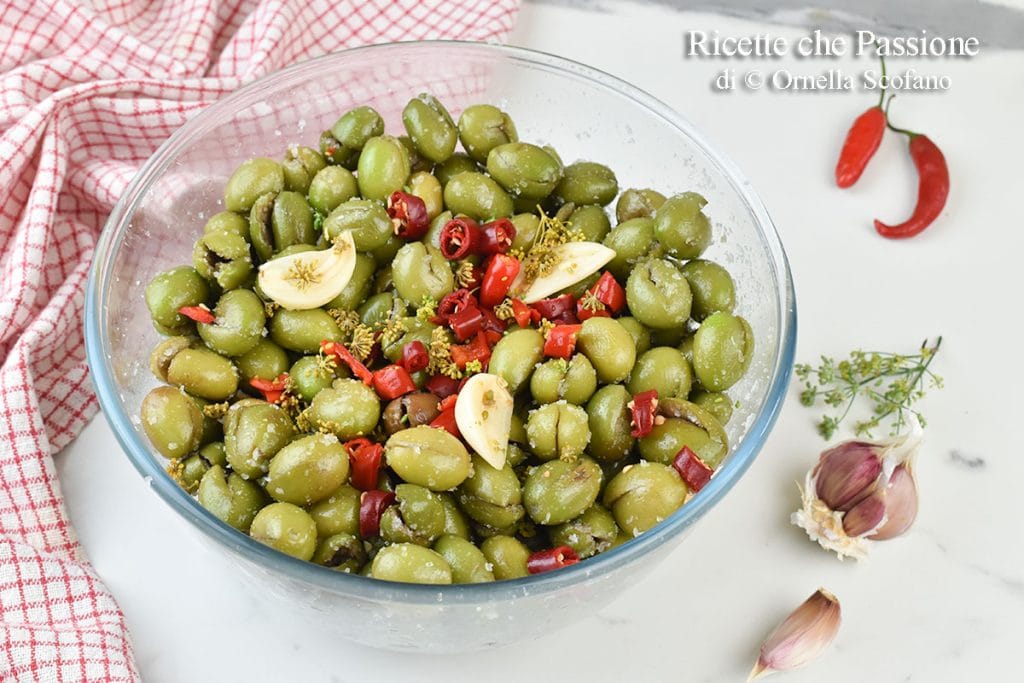
Olives in jar
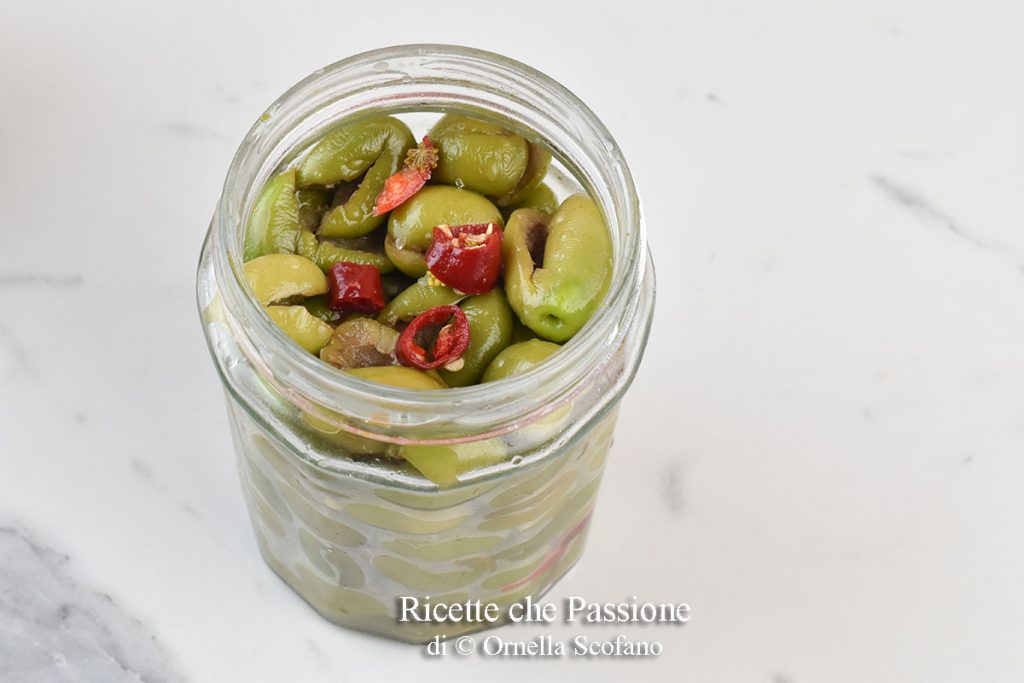
11. When finished, cover with olive oil or, if you prefer, sunflower oil, either way, they turn out perfect. Don’t close immediately, so if you need to top up a little oil, you can add it and then seal the jars and leave them in the pantry for a few days before starting to enjoy your Calabrian crushed olives, but they are delicious even to eat right away. They are excellent with tomato salad, in our recipes, such as the hunter’s rabbit, delicious on their own for a tasty appetizer or aperitif.
Page with affiliate links
If properly prepared with the right amount of salt, crushed olives in oil can be preserved for a couple of years, staying firm and fragrant as freshly made. Therefore, it is recommended to taste them; if they seem under-salted, it’s better to add a bit more salt.
FAQ
Can they be preserved without oil?
Yes, crushed olives can also be preserved in brine, crushed olives in brine.

